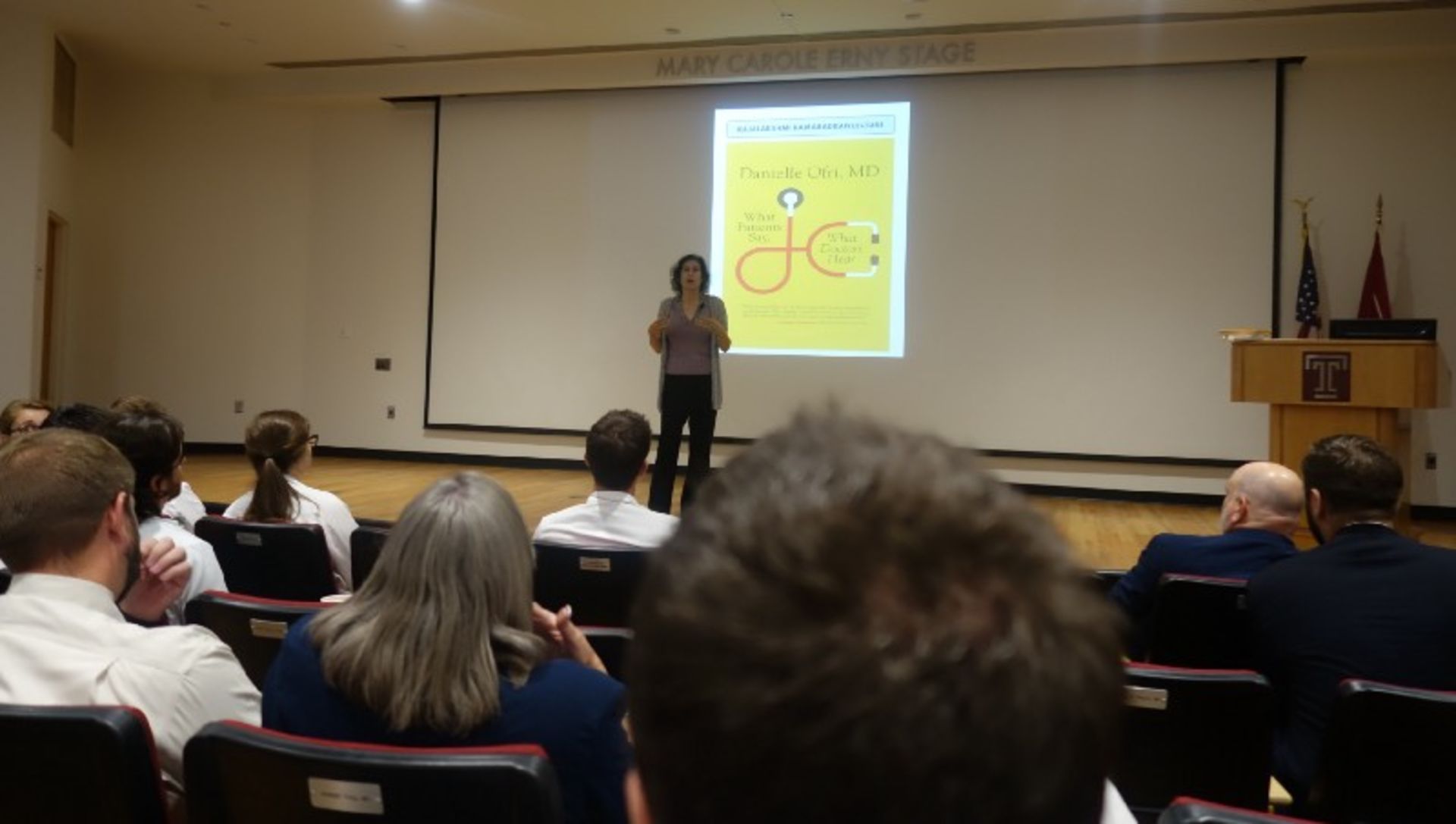Give Conversation a Chance!

Danielle Ofri, doctor, writer, editor, told physicians at grand rounds on Wednesday at Temple University Hospital that listening is the best medicine.
She called the caregiver-patient conversation, “the bedrock of medicine,” and “the single most important medical tool there is.”
Dr. Ofri, an internist at Bellevue Hospital in New York, editor of the Bellevue Literary Review, and author of several books, gave an annual lecture on patient safety, making the argument that listening to patients can prevent errors and harm.
But her impassioned plea went well beyond that. The patient story, she said, is at the foundation of good care, too often disregarded in favor of scans and tests and procedures.
“Give conversation its due,” she argued.
In writing her most recent book, What Patients Say, What Doctors Hear, she did extensive research, and found one study in Europe where doctors actually let patients speak uninterrupted until they were finished. She said she knows this is every doctor’s worst fear, but the study found the average patient talked for only 97 seconds.
She decided to test this out in her own practice the very next day.
“Tell me what’s happening,” she would tell her patients, and then not say a word.
The first few patients were surprisingly short, she said, 37 seconds, 47 seconds, 90 seconds. “Then came the kicker,” she said, a teacher from Argentina. “Everything hurts in her body,” the doctor said, and she has anxiety, depression, irritable bowel, a good for nothing son who won’t move out, an aging mother she cares for, an unappreciative boss, and New York can’t compare to the elegance of Buenos Aires. Dr. Ofri feared this woman would “provide a rundown of every symptom and organ system in her body, and all her mother’s ills…” and that “the whole thing will turn out to be a sprawling, onerous mess.”
But she promised she would do this for all her patients that day. “So I gird myself for battle,” she said. “And I let the stop watch run.” The patient launched: “`Everything hurts from my head to my toes… My feet are swollen, my head is swollen. I’m 45 and feel 85. Another thing and another thing…’
“I’m writing and writing,” says Dr. Ofri, “but finally she comes to the end. I think `OK, this has been like 20 minutes.’ I look at stopwatch. 4 minutes and 20 seconds. It was really amazing.”
The list of problems was actually manageable, Dr. Ofri said. And the patient said something she’d never heard before: “Just talking about this has actually made me feel better.”
Dr. Ofri added, “It made me feel better too.”
Dr. Ofri said patients like this are used to having “doctors shutting them up very quickly,” and they often become high utilizers of services because they never get satisfaction. And this high use leads to higher likelihood of errors and harm.
“Uninterrupted listening,” Dr. Ofri said, “sounds inefficient but in fact it’s wonderfully efficient. Let a patient talk, uninterrupted for 60 seconds or 90 seconds. Eyes on your patient. Not writing on your computer. Most of us rarely get the experience of being listened to straight on like that. It’s kind of a liberating experience and very energizing. Then after a minute say `I don’t want to miss what you’re saying. Do you mind if I take notes….’”
Dr. Ofri said subsequent visits with the Argentinian teacher, “were much easier and much shorter.” The patient knew she’d get “all her stuff out.”
Dr. Ofri borrowed from Hemingway: “When people listen, listen completely.”
She also spoke about what doctors say, and how their words have great power.
She again cited numerous studies. In one, about chest tube pain, half of patients “got morphine on schedule, just running in. Half got it from the doctor coming in, talking to them, acknowledging their pain, all the rituals. Being there and caring.”
That half, with doctor interaction, had much higher pain relief scores.
“The act of listening and bearing witness is a big part of what we do,” Dr. Ofri said. “We bear witness to their pain and struggles and travails. Unburdening the soul is a big part of our job.
“If our words and actions can relieve pain” she said, “we should be making use of that.”
• • •
Michael Vitez, winner of the 1997 Pulitzer Prize for Explanatory Journalism at The Philadelphia Inquirer, is the director of narrative medicine at the Lewis Katz School of Medicine at Temple University. Michael.vitez@temple.edu
